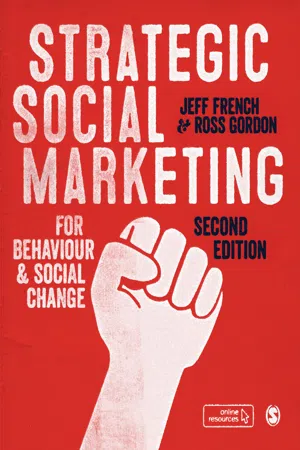
- 576 pages
- English
- ePUB (mobile friendly)
- Available on iOS & Android
About this book
Adopting an international approach and offering a broader context, this second edition of Strategic Social Marketing presents social marketing principles in a strategic, critical and reflexive way, illustrating the value of applying marketing to solve social problems, including:
• A brand new chapter on evaluation.
• Updated advances in relevant research and theorizing.
•New vignettes and short case studies to illustrate theories throughout the text. The authors explore the reasons why marketing should be an integral component of all social programme design and delivery when looking to achieve social good, while progressingon to the nature and application of social marketing; rethinking traditional concepts such as 'value' and 'exchange' in the social context. Their hands-on features then let students lay out strategy, plans, frameworks and tactics to influence behaviours.
Tools to learn more effectively

Saving Books

Keyword Search

Annotating Text

Listen to it instead
Information
1 The Role and Contribution of Social Marketing
Learning objectives
- understand why social marketing is increasingly being incorporated into social strategy development as well as the operational delivery of programmes
- articulate some of the key weaknesses associated with many current approaches to social policy and strategy aimed at influencing behaviour
- describe the key added value associated with the adoption of a strategic marketing approach to social policy selection, development, delivery and evaluation.
Introduction
Concerned with the application of marketing knowledge, concepts, and techniques to enhance social as well as economic ends. It is also concerned with the analysis of the social consequences of marketing policies, decisions and activities.
Social marketing seeks to develop and integrate marketing concepts with other approaches to influence behaviours that benefit individuals and communities for the greater social good. Social marketing practice is guided by ethical principles. It seeks to integrate research, best practice, theory, audience and partnership insight, to inform the delivery of competition sensitive and segmented social change programmes that are effective, efficient, equitable and sustainable.
Out with the old, in with the new
Marketing focused social programme design
Table of contents
- Cover
- Half Title
- Acknowledgements
- Title Page
- Copyright Page
- Acknowledgements
- Contents
- About the Authors
- Acknowledgements
- Foreword to the Second Edition
- Online Resources for Lecturers
- 1 The Role and Contribution of Social Marketing
- 2 Social Marketing Principles
- 3 Strategic Social Marketing
- 4 Systems Social Marketing
- 5 Critical Social Marketing
- 6 Planning and Designing Social Marketing Interventions
- 7 Creating Value in Social Marketing
- 8 The Social Marketing Contribution to Social Programme Design
- 9 Embedding Social Marketing within Social Programmes
- 10 Applying Behavioural Theory and Science in Social Marketing
- 11 Research Perspectives and Social Marketing
- 12 Qualitative Research and Social Marketing
- 13 Quantitative Research and Social Marketing
- 14 Social Marketing’s Contribution to the Big Behavioural Influence Toolbox
- 15 The Social Marketing Intervention Mix
- Index
Frequently asked questions
- Essential is ideal for learners and professionals who enjoy exploring a wide range of subjects. Access the Essential Library with 800,000+ trusted titles and best-sellers across business, personal growth, and the humanities. Includes unlimited reading time and Standard Read Aloud voice.
- Complete: Perfect for advanced learners and researchers needing full, unrestricted access. Unlock 1.4M+ books across hundreds of subjects, including academic and specialized titles. The Complete Plan also includes advanced features like Premium Read Aloud and Research Assistant.
Please note we cannot support devices running on iOS 13 and Android 7 or earlier. Learn more about using the app